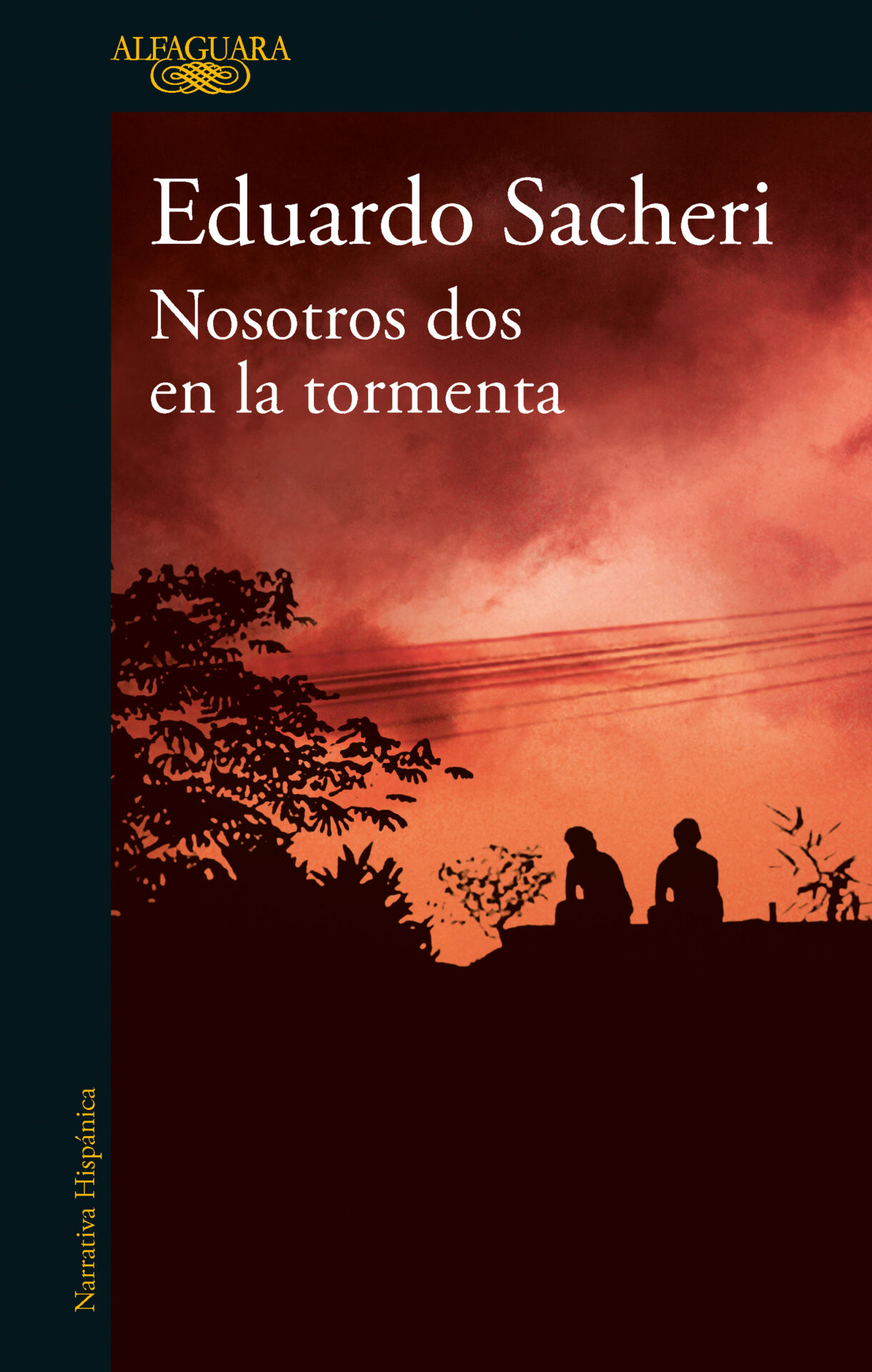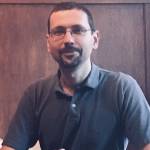Many embrace idea words like revolution or country and wave them like flags, but like undulating flags, these idea words sometimes get torn up and lose all meaning in the end. The protagonists of Nosotros dos en la tormenta (Alfaguara, 2023), from writer Eduardo Sacheri, are young militants from groups like Montoneros and the People’s Revolutionary Army (ERP in Spanish), as well as their skeptical, frustrated, or misunderstood families, and police and military working for the national cause.
Set in the seventies, in a convulsing Argentina one year before the military coup led by Rafael Videla and others, Sacheri’s new novel, with its measured emotive tone and rich shades of irony, recapitulates this complex period in which the actions of a few guerrilla organizations promised the advent of a new country after the death of Juan Domingo Perón.
“People think death is supposed to be meaningful. But the more bodies that pile up, the less each death means,” says El Cabezón to his friend Alejandro, referring to the modus operandi of the ERP. Nosotros dos en la tormenta is a book about doubt and questioning one’s beliefs, with a look towards a past that could easily have been the present day.

Juan Camilo Rincón: What was it like to build a storyline with such a complex history as the backdrop?
Eduardo Sacheri: This novel gave me a good amount more work than others, even if every novel is work. In this case, I knew I’d be grappling with a painful period of conflict. The novel is set in 1975 (I was eight years old at the time) and it seemed important to study this period—please note the verb I used, study—to remove it from the realm of my own personal, family memories, which were in many ways the emotional driving force behind this story. I would say that first I did an entire academic study. A lot of work has already been done in Argentina on armed organizations, ideology and organizational structure, as well as the connection between these things and political power and social relations, or lack thereof. In addition to that, I had conversations with ex-guerrillas and their victims or relatives of their victims—it seemed important to bring a human dimension back to those whose lives were so spectacularly affected. Only then did I begin on the plot. I asked myself: What can I tell about this period? What kinds of characters can I construct? At that point I envisioned them as paths that cross. I didn’t want to impose a way of reading, independently of each individual’s ideas. Instead, it was more interesting to create a point of dialogue, or at least to let the story be seen from different perspectives—my perspective being just one of many. I think that was the biggest challenge of this novel.
J.C.R.: The dictatorship has been portrayed extensively in Argentine cinema, music and literature, but your novel precedes this period. How did you address this period in your novel?
E.S.: The entire novel takes place in 1975. I picked that year because it was extremely turbulent, even if it was before the coup. In Argentina, the military government has been given enormous attention in the cinema and in literature, with good reason, but that’s not the case for the preceding period or the period directly afterwards, even though a ton of things happened, a ton of situations and political actors intertwined in the story. Perón had returned to Argentina in ’73. Two months before that, a general election took place in which he was not allowed to participate, and it was won by Héctor Cámpora, his assistant, his right-hand man, his proxy. Cámpora stepped down almost immediately afterwards, and new elections were called. Perón was elected, with his wife María Estela Martínez de Perón serving as vice president. Several revolutionary organizations were active in that Argentina, especially Montoneros and the People’s Revolutionary Army (ERP), whose base was Trotskyist, Maoist, and Guevarist, a very orthodox left. Although Montoneros had the same objective of social revolution, a socialist paradise, they made the decision to support Perón. This was a conscious decision made voluntarily: if the people are Peronist, we have to be, too. When Perón was in exile, this youthful agitation for his return was beneficial to him, but when he returned, his order was: now you must be disciplined, fall into line, follow orders, you are part of the movement. This was a Perón that was clearly more a creature of the right than the left.
J.C.R.: And therein the source of the split…
E.S.: Right, because Montoneros refused to fall into line. Perón died almost immediately afterwards, and at that point Peronism descended into a violent confrontation between the Peronist right and left. In the novel, it wasn’t my preference to get into the nitty-gritty of this conflict. Rather, it was to feature the project of both these organizations, but this was an Argentina where violence was considered a legitimate weapon for a large number of political actors. These young people were convinced that violence was a good thing; a short while later, the military would carry out a coup d’état based on the same concept; and Isabel Perón’s government also implemented an extremely violent program of repression of the left. It was a violent society, but all of that was seen as par for the course by masses of people. This is where I feel that while Argentina today has an infinite amount of problems, it’s not that often that you meet people who legitimize violence. But in my childhood, these young people were a good example of that violence.
J.C.R.: Let’s talk about the young militants who are the protagonists of the novel. How did these characters come about?
E.S.: The majority of these young people first began their association with leftist organizations in high school or university. Since I was thinking about two people who were friends since childhood, I decided that one would take the path of the ERP, and the other Montoneros. These were not enemy organizations, nor did they fight each other—they ran in parallel. This setup allowed me to have them criticize each other in their conversations and distance themselves from the other group’s party line. Between these two friends, Alejandro and El Cabezón, I also liked the idea of one of them having more conviction, being more sure of himself, more determined, and the other one being more full of doubt—I have the sense that when a person takes up the flag of an ideology, the certainty of it is soothing. In anything, not just in politics, doubt leads a person to a more agonizing place, although that’s more interesting to me. So they make life-and-death decisions because they puff themselves up as these ultimate judges: So-and-so deserves to be kidnapped, while this other guy deserves to die. Zealots believe this is the way things are, period, but the other character does not feel that way. This affords the reader an escape from ideological claustrophobia. That’s why Cabezón is full of doubt: why did we choose this person? Something that has always given me pause is this thing about choosing someone and deciding they’re the enemy, and that’s what Cabezón wonders at one point: why are we against this person? What makes them worse? No, it’s simply because they’re close by.
J.C.R.: And that’s exactly it—you develop your characters without a Manichean vision…
E.S.: I don’t tell you who is good and who is bad. I have my own ideas about it, but that doesn’t matter. The novel came out this past June in Argentina, and I’ve already gotten feedback from readers. A journalist asked me what my position was. I asked her, “What’s your position?” Her view was much more sympathetic to these two young people. In another interview I had, the journalist clearly had a very critical view towards them, and it seems like a good thing to me that both these journalists thought the novel was good. There are things that we cannot agree on, but we can at least read the same things, because sometimes it seems as if art has to subordinate itself to our preconceived notions, and I don’t like that. This whole thing about “I can only read people who say things I ascribe to” is not a good thing. But be careful: if as a reader I feel I am being given a sermon from a position that is too far removed from mine, I don’t like that either, and I put up a wall against it.
J.C.R.: Which of the characters is closest to your heart?
E.S.: I identify most with two characters. One is the father of one of the protagonists. This father does not agree with his son’s ideas. He believes the idea of revolution will fail and his son will die. He says to his son, “In this, you and I are alike: we both have dreams that will never happen. The difference is that I know it.” The other character is Mónica, the daughter of professor Mendiberri. This is a university professor who is purposely not constructed like the stereotypical radical professor, and he is further away from events. He is a geologist who is mainly interested in the Earth’s crust, but a string of mishaps puts him in the crosshairs of the authorities. All that matters to him is rocks, so he is completely alienated from what is going on around him, but his daughter isn’t. I imagine being a witness to the dangers and being unable to do anything about it. In regards to the tragic inexorability of events, it must have been grueling. This is a character I identify with a lot.
Translated by Slava Faybysh



